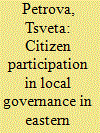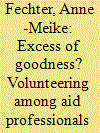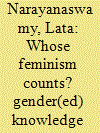| Srl | Item |
| 1 |
ID:
167577


|
|
|
|
|
| Summary/Abstract |
Each year over the last decade, there were on average 400 humanitarian disasters or emergencies, killing more than 100,000 people and affecting a further 200 million. Such humanitarian events require immediate responses as well as effective longer-term activities to aid communities recover. The global response is now valued over US$27 billion annually. More than half a million people are estimated to work in this sector, the majority being locally engaged staff. The international community provides significant resources to assist local communities impacted by these humanitarian emergencies. This aid flows through multiple channels, including national and regional governments, international non-governmental organisations and local community based organisations. Increasing the skills and knowledge of leaders and managers of these responses is a critical need to ensure the most effective recovery in communities as well as use of resources. Understanding the professional journey in the humanitarian sector is vital, but currently limited. As the humanitarian sector continues to expand, greater focus on the skill-set needed by humanitarian workers responding to these events is needed. However, tensions exist between the primacy given to the experiences and soft-skills of humanitarian workers over the value of academic qualifications. This paper provides some suggestions how this tension within the humanitarian sector may be addressed and reconciled. This paper presents new data based on interviews with 20 humanitarian professionals from a range of humanitarian aid agencies and considers their experiences and reflections on building a career within the humanitarian sector.
|
|
|
|
|
|
|
|
|
|
|
|
|
|
|
|
| 2 |
ID:
106219


|
|
|
|
|
| Publication |
2011.
|
| Summary/Abstract |
This article studies the impact of citizen participation on local government performance in Bulgaria. Both survey and interview data are used to suggest that, all else being equal, municipal efficacy grows with the increasing involvement of social and economic actors in the policy-making process. This improved government efficacy is most likely a result of the professionalisation and organisational strength of the third sector. Although the politicisation of the local state has undermined its capacity, municipalities have been able not only to reconstitute some of their authority but also to improve the output and the quality of their policy making by employing the expertise and support of major local civic organisations.
|
|
|
|
|
|
|
|
|
|
|
|
|
|
|
|
| 3 |
ID:
155718


|
|
|
|
|
| Summary/Abstract |
This article explores the meaning of volunteering among professional aid workers. While they experience disenchantment in their daytime work, volunteering provides them with benefits lacking in their paid jobs. At the same time, a compensatory model does not capture the complex dimensions of this relationship. One motive behind their professional work – bringing about positive change for others – is also the driving force behind their voluntary practices. Such excess of doing good may be indicative of their overall commitment. If aid workers make sense of their actions within a framework of alienated labour, rendering their waged aid work as a commodity, volunteering emerges as a remedial response. At the same time, their paid and unpaid work is animated by the impulse of giving. Such co-existence implies that gifts and commodities are not mutually exclusive; or indeed that both can be understood, following Parry (1986), as emerging from a highly developed capitalist system.
|
|
|
|
|
|
|
|
|
|
|
|
|
|
|
|
| 4 |
ID:
059409


|
|
|
|
|
| Publication |
London, Routledge, 2004.
|
| Description |
x, 310p.Pbk
|
| Standard Number |
041524255X
|
|
|
|
|
|
|
|
|
|
|
|
Copies: C:1/I:0,R:0,Q:0
Circulation
| Accession# | Call# | Current Location | Status | Policy | Location |
| 049273 | 907.2/LAM 049273 | Main | On Shelf | General | |
|
|
|
|
| 5 |
ID:
149437


|
|
|
|
|
| Summary/Abstract |
Gender and development (GAD) has become a transnational discourse and has, as a result, generated its own elite elements. This elitism has tended to be attributed to a Northern hegemony in how feminism has been articulated and then subsequently professionalised and bureaucratised. What has received less attention, and what this paper highlights empirically, is how Southern-based feminisms might themselves be sites of discursive exclusion. The paper interrogates these concerns through an analysis of how professionalisation is evidenced in feminist engagement among civil society organisations working on gender in New Delhi. The analysis suggests that efforts to create spaces for subaltern voices are constrained not only by the disciplining effects of neoliberal frameworks but also – and in tandem – by Southern elite feminist priorities. The implications of these findings are significant: processes of professionalisation and the elitism they engender may have the effect of potentially precluding the engagement of those people on the margins whose voices are so sought after as part of efforts to facilitate inclusive development.
|
|
|
|
|
|
|
|
|
|
|
|
|
|
|
|